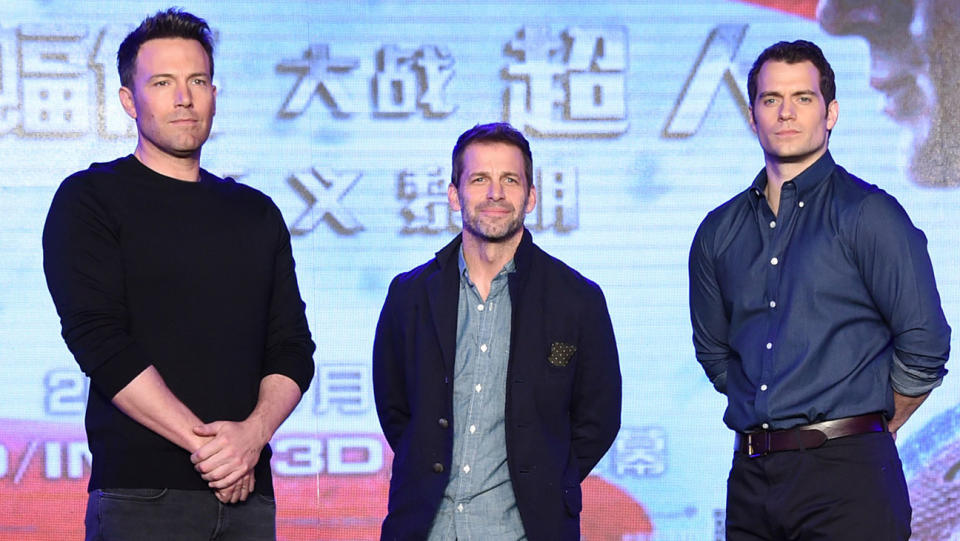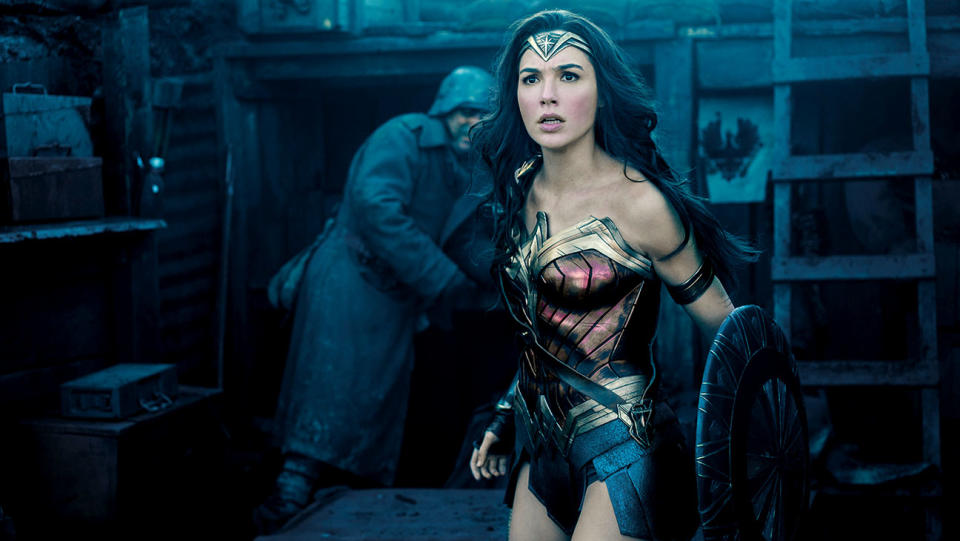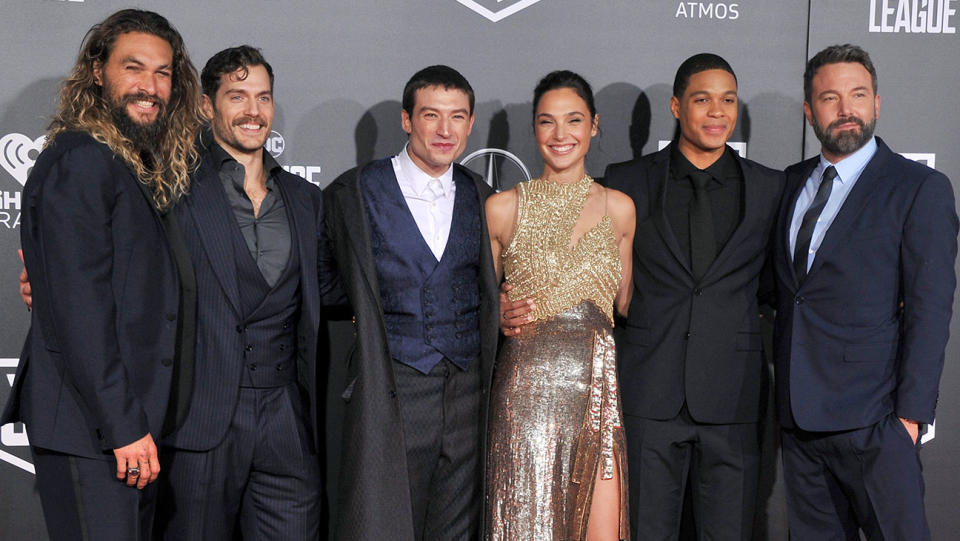Goodbye DC Extended Universe: We Hardly Knew You (Yet We Knew You Too Well)
- Oops!Something went wrong.Please try again later.
- Oops!Something went wrong.Please try again later.
- Oops!Something went wrong.Please try again later.
- Oops!Something went wrong.Please try again later.
- Oops!Something went wrong.Please try again later.
- Oops!Something went wrong.Please try again later.

In December 2018, Aquaman arrived with the amount of fanfare appropriate for the moment. It was the height of comic book culture, and one of its reigning kings, Jason Momoa, arrived at the movie’s blue carpet premiere with a golden trident. Full to the brim with bluster, he performed a ceremonial dance with members of the Maori community while wife Lisa Bonet and the couple’s kids stood in the wings. Stars Nicole Kidman and Amber Heard brought the glam and the shouts from photographers. After a raucous screening, the festivities then moved from the Chinese Theatre to the poolside afterparty at the Roosevelt Hotel.
The film would ultimately top $1 billion and stood as part of a zenith for comic book movies, in a year that included Black Panther, Avengers: Infinity War and Spider-Man: Into the Spider-Verse.
More from The Hollywood Reporter
Five years later, things are much different. The sequel, Aquaman and the Lost Kingdom, washed in like a low and calm tide this week, with a pre-screening reception for influencers at high-end shopping mall The Grove. The only above-the-line talent in attendance were Momoa and director James Wan, who posed in front of a cardboard cutout of the film’s logo. There was no afterparty, and the studio technically called it a “fan screening,” not a premiere.
And that, in one way, encapsulates the melancholic arc to Warner Bros.’ DC Extended Universe, the series of films that spanned a decade, launched multiple actors to the A-list, and inspired (for good and ill) a fandom so passionate it was unlike any other.
It was an era ushered in by a visionary filmmaker whose time at the studio was cut short; by movies that weren’t supposed to be big, such as Aquaman, which went on to gross over $1.1 billion worldwide, and movies that should have been big, but weren’t, such as Justice League. It was an era where many DCEU movies and projects were swept around the fast-changing, deep-sea currents of corporate media and even corporate scandal. The tide did indeed turn, many times, and not in the ways anyone expected.

Filmmaker Zack Snyder gets both praise and hate for the dark, saturated tones that permeated the DCEU. But it’s important to remember that at the atomic level, the universe’s roots can be traced back to Christopher Nolan and then-Warners chief Jeff Robinov.
It was Robinov who, amid Nolan’s Dark Knight trilogy, made grand plans for Nolan to produce multiple DC movies, and perhaps even oversee the whole line, starting with a Superman movie. Nolan, in turn, hired Snyder to direct Man of Steel, which the Dark Knight filmmaker produced.
The question of why Nolan didn’t continue and oversee more projects has never been fully answered. Perhaps his singular focus was on directing his own movies. Perhaps Snyder’s ultimate vision wasn’t for him. In the end, Snyder received his strongest backing from Robinov and his lieutenant, Greg Silverman, who later became production president after Robinov exited in 2013.
In 2014, Robinov ‘s successor Kevin Tsujihara unveiled a now-infamous ten-picture plan, one with the promise of a sunrise glinting off the towering orb of the Daily Planet building. Wonder Woman, Flash, Aquaman, Cyborg, Green Lantern, Suicide Squad, Shazam! and two Justice League movies were all announced and put on the calendar. The studio, or whatever owner it happened to fall under that year, wanted the DCEU to be a Marvel Cinematic Universe, a comparison with historical roots in the publishing world. It was a comparison that plagued the DCEU unfairly, and something Snyder had no interest in entertaining.
It was never in the cards for DC to become a Marvel, and much of that ten-film vision never came to pass. Yes, Wonder Woman became a genuine global phenomenon, and Aquaman remains the third highest-grossing Warners movie of all time. But Wonder Woman also birthed a maligned sequel that was released amid the pandemic; a third installment was announced then publicly swept under the rug. The Flash finally came out this year, but got its shoe-laces tied up by critics and audiences.
In between all of this, there were spinoffs and sideshows. There were Suicide Squad and Birds of Prey. And Warners used its power ring to snag James Gunn for The Suicide Squad after Disney temporarily fired him as director of Guardians of the Galaxy Vol. 3. Some of the bigger DC movies during this time weren’t part of the DCEU at all. 2019’s Joker evoked 1970s Martin Scorsese and was an Oscar-winning billion dollar hit, while 2022’s The Batman, a crime saga worthy of Michael Mann comparisons, earned a solid $771 million globally.
And what of the movies that never were? The paths not taken? Spare a moment to stand at the tombstones of Ben Affleck’s Batman movie and Ava DuVernay’s New Gods feature (there is some debate of whether or not she even submitted a full script to the studio). David Ayer was assigned a Gotham City Sirens project as a consolation prize after the studio took Suicide Squad’s cut away from him. Warners announced a Blackhawk movie to be produced by Steven Spielberg and a Joss Whedon Batgirl feature also got a fancy press release. And let’s not even talk about the never-made Henry Cavill Superman movie lest the Cavillry be brought to tears. And perhaps a notable should-have-been, had ego not gotten in the way: a Shazam versus Black Adam movie that was yearned for, but Black Adam star Dwayne Johnson nixed the idea and angled for his own movie.
The ultimate sideshow was the corporate one. Tsujihara was ousted in a sex scandal in March 2019. Meanwhile, Warners and DC were ping ponged between owners AT&T, which took over in 2016, then Discovery, which bought the company in 2022. Amid all that, a completed Batgirl movie was put into the Batcave to be never seen again, sending shivers through the creative community.
Marvel boss Kevin Feige has said Disney’s acquisition of Marvel was “the greatest thing that ever happened to us.” It gave the company more resources — and just as importantly, stability. Can you imagine what a Marvel slate would look like if it changed owners or studio heads as many times as Warners?
And there’s the dilemma. Everybody wanted DC, but few knew what to do with it. And along the way, critics and the media were quick to pounce on any perceived failures.

The making of the DC movies was a true reflection of their times. Snyder became the unfurled flag for cult of personality at a time when half of America, even the world, elevated polarizing figures onto pedestals they promised to die defending. The movies seemed to be bigger on Twitter than in the real world, something that hit its apex as an Internet army, real or imagined, helped the creation of the SnyderCut, an event that is not likely to ever be repeated.
Most of the movies themselves had no stickiness — it’s not like Aquaman, despite being a $1 billion hit, is some sort of cultural touchstone (give it time, maybe?) — though Wonder Woman did transcend, aided by the fact that like Diana’s bracelets, it was reacting against the pervading toxic masculinity of the times.
One thing that did stick, however, was the casting. A generation came of age believing that Cavill is the Superman of all Supermans. Gal Gadot was indeed perfect as Wonder Woman. Ben Affleck is a Batman denied. It’s not easy to find the Trinity, but Snyder and company did accomplish that. Ezra Miller turned in a strong dual performance in Flash, but the film was dinged amid their legal and mental health issues, as well as Warners execs claiming it was one of the greatest superhero movies of all time, which only set it up to disappoint. Zachary Levi and Asher Angel excellently captured the twin voice of Shazam/Billy Batson in Shazam!, an underappreciated delight made away from prying executive eyes by the New Line division that the studio failed to market properly.
In the end, the sum of the parts were greater than the whole.

The likely real and long-lasting legacy of the DCEU won’t be revealed until some years down the line. Recall, if you will, how Star Wars prequels were disliked by many when they came out in the aughts but 20 years later, they are touchstones for a whole generation for whom those are Star Wars. Who knows how these will resonate for those growing up on the DCEU.
The next year, however, will give us moment to take better stock. There is only one DC movie on the docket, Todd Phillips’ Joker: Folie à Deux, which is not connected to any larger universe. There will be only one Marvel Studios movie released (Deadpool 3). It’s the first real break from the genre audiences will get in maybe over a decade. (We’re not counting next year’s Sony Marvel movies — Madame Web, Kraven the Hunter and Venom 3 – which always felt like B-sides to the hit singles.)
That break is good on the DC side as it seems to cleanse the palette for the launch of the era of DC Studios, the division launched this year by Gunn and Peter Safran. (Strangely, the lead character and actor from this summer’s little seen Blue Beetle will somehow carryover into the new era. Why that character and actor? Time will tell, I guess.) The first title will be Gunn’s own take on the Man of Steel, Superman: Legacy, and be released July 11, 2025.
It’s not until then will studios, fans, and audiences really know if the moment we are in now is temporary superhero fatigue or if the genre’s moment of dominance is really over.
Best of The Hollywood Reporter
Eight Actors Who Have Played Willy Wonka in Films and on Broadway
Martin Scorsese’s 10 Best Movies Ranked, Including 'Killers of the Flower Moon'

